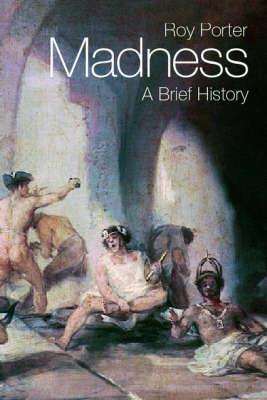Overview
This story of madness reveals the radically different perceptions of madness and approaches to its treatment, from antiquity to the beginning of the 21st century. Roy Porter explores what we really mean by ""madness"", covering an enormous range of topics from witches to creative geniuses, electric shock therapy to sexual deviancy, and psychoanalysis to Prozac. The origins of debates about how we define and deal with insanity are examined through eyewitness accounts of those treating patients, writers, artists, and the mad themselves.
Full Product Details
Author: Roy Porter
Publisher: Oxford University Press
Imprint: Oxford University Press
Dimensions:
Width: 12.00cm
, Height: 2.20cm
, Length: 17.00cm
Weight: 0.328kg
ISBN: 9780192802668
ISBN 10: 0192802666
Pages: 253
Publication Date: 01 May 2002
Audience:
College/higher education
,
Professional and scholarly
,
Undergraduate
,
Postgraduate, Research & Scholarly
Format: Hardback
Publisher's Status: Active
Availability: To order

Stock availability from the supplier is unknown. We will order it for you and ship this item to you once it is received by us.
Reviews
Roy Porter's untimely death deprived us of one of the outstanding scholars of his generation. This short book on how mental illness has been defined and treated through the ages is brilliantly done. It's concise but not reductive; readable but not dumbed down. Porter wears his vast interdisciplinary learning lightly, and has the knack of combining elegantly clear summary with vivid and intriguing detail - from witchcraft to Freud; from Bedlam to psychopharmacology and beyond. And Porter is also highly informative whilst whetting the reader's appetite for more. In this way the book functions as an ideal (and handsomely produced) introduction to its subject; and as a compelling gateway onto its author's more than 80 other books.
A generously illustrated and pocket-sized distillation of the ways madness has been perceived and treated, from ancient times to the present. Highly acclaimed medical historian Porter (Social History of Medicine/Univ. College London; The Greatest Benefit to Mankind: A Medical History of Humanity, 1998, etc.) traces changes in attitude toward madness all the way from prehistoric beliefs in demonic possession to the contention of some modern theorists that mental illness simply does not exist. He demonstrates how beliefs in supernatural causes were challenged by Greek medicine, which developed an explanation based on the four bodily humors (blood, phlegm, black and yellow bile), and how that approach was subsequently adopted by Western medicine. With generous use of quotations, he illustrates how in the 17th century new organic theories of insanity linking mind and body began to emerge, leading to the hope that those with mental disorders could be helped through retraining of their minds. Porter examines the drive toward institutionalization, how practical psychiatry developed from the experience of asylum managers, and how disappointment with the results of benign moral therapy led to the growing belief that madness was probably hereditary and incurable, which in turn led to compulsory confinement, sedation, and even sterilization. He chronicles the rise and decline of psychoanalysis, both Freudian and non-Freudian, the enormous impact of psychopharmacology, and the proliferation of psychotherapies designed to treat the astonishing number of conditions labeled as mental disorders in the American Psychiatric Association's current Diagnostic and Statistical Manual. For those whose appetite will have been whetted by this literate little introduction, Porter appends a well-annotated selection of readings on aspects of his subject just touched on here. A small book that raises big questions about the profession of psychiatry and the notion of scientific progress. (28 b&w illustrations, many of them etchings and engravings from the 16th to 19th centuries) (Kirkus Reviews)
Where does eccentricity end and madness begin? Are all geniuses slightly mad? These and other questions are discussed in an academic way by medical historian Professor Roy Porter, whose 85th and last book this was. Porter had a gift for succinct analysis, and never did he show it better than here. Starting in antiquity and bringing us forward to the era of Prozac and Valium, Porter explains that insanity has always been an uncomfortable topic for doctors, who have never been able to agree a definition among themselves. What some have seen as madness, others have regarded as nothing more than oddball, and ailments such as epilepsy were once regarded as insanity by some and as demonic possession by others. In these more enlightened times we often find that popping a pill can control what would once have been thought a curse from God. Porter quotes from classical literature as well as papers from the 19th and 20th centuries to show the changing attitudes to mental disorders and how they were treated. From ice-cold baths to electric-shock therapy, he discusses what the effects were on those afflicted. Writers, artists and medical staff are quoted for their various and contradictory opinions, while Porter also devotes space to the words of those who were certified insane. In a book of this size it is impossible to study such an emotive topic to any depth, and Porter never attempts to do so. Instead, he provides an overview of the subject of mental health and goes on to suggest other titles that deal more fully with particular aspects. The book is well illustrated, showing the often-brutal methods of treating the mentally-ill over many centuries. (Kirkus UK)
Author Information
Roy Porter is Professor of the Social History of Medicine at the Wellcome Trust Centre for the History of Medicine at University College London. He is the author of over 80 books, including Enlightenment: Britain and the Creation of the Modern World and A Social History of Madness.



